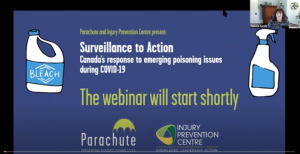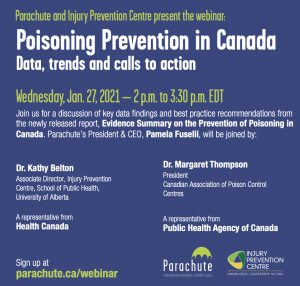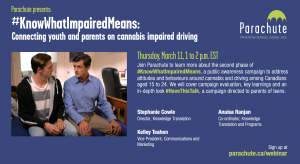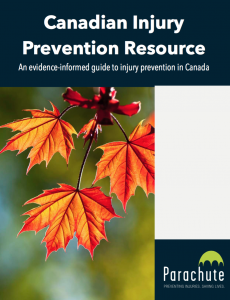Parachute and our partners offer many training courses in injury prevention in areas of:
- Concussion recognition and management
- Fall prevention
- Road safety
Check out these resources for links to course materials and more information on certifications.
In addition, Parachute hosts webinars and presentations, whether standalone or as part of online conferences, on a variety of topics related to injury prevention of interest to professionals in areas such as public health, child safety, poison prevention and road safety.
Resources
Course materials and certifications
-
Canadian Fall Prevention Curriculum (2017)
The CFPC provides those working with older adults the knowledge and skills needed to apply a public health approach to the prevention of falls and fall-related injuries. Participants learn how to design, implement and evaluate a fall prevention program tailored to their work or community setting.
-
Canadian Injury Prevention Curriculum
The Canadian Injury Prevention Curriculum (CIPC) is a unique resource focused on the study of injury prevention theory and practice. Built on Canadian content and using real Canadian examples, the curriculum is targeted to community-based injury prevention stakeholders.
-
Canadian Injury Prevention Resource
-
Concussion Awareness Training Tool (CATT)
The Concussion Awareness Training Tool (CATT) is a series of free e-learning modules for different audiences: parents, coaches, athletes, educators, medical professionals, and those working with survivors of intimate partner violence.
-
Road Safety Professional Certification
The RSP certification provides for professionals involved in a wide array of safety-related disciplines to establish their competency in providing for the safety of the traveling public. The goals of the RSP certifications are to recognize road safety as a profession, to establish a recognized level of practice and knowledge and to incentivize safety education.
Provided by The Transportation Professional Certification Board (TPCB).
Injury prevention webinars
-
An interview with Jessie Singer, author of There Are No Accidents (2022)
Jessie Singer’s best friend died 15 years ago when he was 22, cycling in New York, and a driver hit and killed him. Singer, a journalist, also became a road safety advocate. Her quest to find out why society often doesn’t take effective action to prevent injury deaths has resulted in the landmark book, There Are No Accidents, published in February 2022. She spoke with Parachute’s President and CEO Pamela Fuselli about the book, which examines who is harmed most by injury in American society. Singer meticulously reviews data and interviews experts. “Accidents are not flukes or freak mishaps – whether or not you die by accident is just a measure of your power, or lack of it.”
Jessie Singer is a journalist whose writing appears in BuzzFeed, the Village Voice, The Awl, New York magazine, The Guardian, and elsewhere. She currently serves as Senior Strategist and Head Writer at Transportation Alternatives, the editor in chief of Reclaim Magazine, and the founding editor of the international Vision Zero Cities Journal. -
Why injury prevention is a key part of health care (2022)
Parachute’s President and CEO Pamela Fuselli interviews healthcare leaders about the role hospitals could and should play in injury prevention. At present, public health organizations are responsible for delivering injury prevention programs, while hospitals and trauma centres respond by providing medical care when injury happens. Traditionally, these systems have not worked collaboratively on a system level. Trauma centres may include injury prevention in their work, but how much and how well is not tracked or measured. In many cases, community agencies, public health units and trauma centres are effectively working with the same population but without connection, strategy, or goals. This space is messy, expensive, and ineffective. How can we do better together? How do we create a seamless or co-ordinated approach to injury prevention?
MODERATOR
Pamela Fuselli, President and CEO, ParachutePANELISTS
Ru Taggar
Executive Vice President, Chief Nursing and Health Professions Executive, Sunnybrook Health Sciences CentreMegan Oakey
Provincial Manager Injury Prevention, BC Provincial Health Services AuthorityDr. David Evans
Medical Director, Research and Analytics Unit, Trauma Services B.C.Richard Louis
Injury Prevention Specialist, NB Trauma Program
Webinars – Child Safety
-
Encouraging active transportation for children (2022)
Active transportation – such as waking, biking and wheeling – are sustainable forms of mobility that not only gets us to where we want to go, but also improve our physical and mental wellbeing.
Join moderator Pamela Fuselli, President & CEO of Parachute, as we discuss how to create and sustain active spaces for children to get to and from school and move though their communities safely.
-
“How to encourage kids to #Play
Safe Outdoors” – Safe Kids Week (2021) The topic of 2021’s Safe Kids Week digital campaign is outdoor play, encouraging children to #PlaySafeOutdoors and engage in active, unstructured and exciting play, daily.
Learn more at www.parachute.ca/safekidsweek #PlaySafeOutdoors -
Children’s falls/ Popping the bubble wrap: Making space for risky play (Fall Prevention Conference 2020)
November 16, 2020 from 12pm to 1pm (EST)
Theme: Children’s falls/ Popping the bubble wrap: Making space for risky play
Presenter: Dr Mariana Brussoni, B.C. Children’s Hospital Research Institute, University of British Columbia -
Preventing Childhood Falls (Fall Prevention Conference 2020)
November 16, 2020 from 3pm to 4 pm (EST)
Theme 1: Preventing Childhood Falls
Presenter: Cara Zukewich, Saskatchewan Prevention Institute
Theme 2: Childhood Fall Prevention: Connecting the Dots
Presenter: Hélène Gagné, Ontario Neurotrauma Foundation
Webinars – Poison Prevention
-
Trends and responses to unintentional pediatric analgesic poisonings (2023)
Medications are the leading cause of poisoning in Canada. Medications that relieve pain, known as analgesics, are the No. 1 substance Canada’s poison centres receive calls about. Hosted by Patti Stark from the Injury Prevention Centre in Alberta and Pamela Fuselli from Parachute, this webinar will feature panellists from the Ontario Poison Centre, Atlantic Canada Poison Centre, Centre antipoison due Québec and the Institute for Safe Medication Practices Canada.
The webinar will provide an overview of trends, data and responses to unintentional analgesic poisonings among pediatric populations. Key messages for parents and caregivers will be highlighted as well as opportunities for collaboration and action.
Learning objectives will include:
- Understanding the burden and trend of unintentional analgesic related poisonings among pediatric populations in Canada
- Key messages for parents and caregivers on how to prevent analgesic poisonings
- Identifying opportunities for engaging stakeholders, such as pharmacists, in raising awareness and preventing analgesic poisonings
Panellists include:
- Jacqueline Burke, Certified Specialist in Poison Information, Ontario Poison Centre
- Audrée Elliot, Pharmacist, Centre antipoison du Québec (CAPQ)
- Laurie Mosher, Certified Specialist in Poison Information, Atlantic Canada Poison Centre
- Alice Watt, Senior Medication Safety Specialist, Institute for Safe Medication Practices Canada (ISMP Canada)
-
Trends in Canada’s drug supply, polysubstance use and unintentional drug poisonings (2023)
Unintentional drug poisonings remain one of Canada’s most devastating public health issues. Hosted by Parachute and featuring presentations from Emily Biggar, Chealsea De Moor and Doris Payer from the Canadian Centre for Substance Use and Addiction, this webinar will provide an overview of emerging trends in Canada’s unregulated drug supply, polysubstance use and harms related to unintentional drug poisonings. Implications for reducing harms to people who use drugs and practising non-stigmatizing language around substance use will be highlighted.
Panelists
Emily Biggar, MPH
Research and Policy Analyst
Canadian Centre on Substance Use and Addiction (CCSA)Chealsea De Moor, MA
Knowledge Broker
Canadian Centre on Substance Use and Addiction (CCSA)Doris Payer, PhD
Senior Knowledge Broker
Canadian Centre on Substance Use and Addiction (CCSA) -
Cannabis & edibles poison prevention: Exploring parent attitudes and behaviours (2022)
Since the legalization and regulation of cannabis in 2018 and edible cannabis products in 2019, unintentional cannabis exposures in young children have increased. This webinar, hosted by Parachute, will explore key data findings from a 2021 survey of parents/caregivers regarding their cannabis use, storage habits and perceptions of unintentional cannabis exposure risk for young children.
The webinar will also provide an in-depth look at child cannabis poisoning trends and key issues, poison centre information and data from across Canada and recommended actions for cannabis poison prevention, as well as priorities for cannabis poison surveillance and prevention.
SPEAKERS
Stephanie Cowle
Director of Knowledge Translation, ParachuteMargaret Thompson
Medical Director, Ontario Poison CentreJacqueline Burke
Certified Specialist in Poison Information
Ontario Poison CentreAndrea Taylor
Acting Senior Policy Analyst, Health Canada -
Exploring illegal cannabis packaging, products and sellers (2022)
The legalization of cannabis in 2018 and cannabis edibles in 2019 was accompanied by regulation on cannabis production, distribution and packaging. However, illicit cannabis products continue to make their way into the Canadian market and consumers’ homes. Illegal cannabis products are often packaged to look like popular brands of candies, snacks or other food products or have more than the allowable limit of THC per package. These products pose a risk to Canadians, particularly young children who may mistakenly consume them.
This webinar, hosted by Parachute, will review the legal requirements for cannabis products, packaging and sellers in Canada and explore the impact of illegal products. Featuring presentations from the RCMP and IWK Poison Centre, the webinar will provide an in-depth look at the history and rationale of packaging requirements as well as the response of poison centres to illegal cannabis products.
-
Notable poisoning trends: what you need to know (2022)
This webinar covered three notable trends in poisoning: medication-related poisonings; youth self-harm poisoning hospitalizations; and essential oils-related poisonings and complaints.
-
Poison Prevention – It’s Not Just For Poison Prevention Week (2021)
The “Poison Prevention – It’s Not Just For Poison Prevention Week” webinar, hosted by Parachute and the Injury Prevention Centre, will bring together partners from across Canada to share their activities for Poison Prevention Week 2021 and ideas for how to continue to promote poison prevention to parents, caregivers and others, year-round.
-
Surveillance to Action: Canada’s response to emerging poisoning issues during COVID-19 (2021)

This 90-minute webinar hosted by Parachute and the Injury Prevention Centre on Feb. 26, 2021, focused on how The COVID-19 pandemic has introduced new poison prevention challenges, with more time spent at home and the introduction of more household cleaners, bleaches and hand sanitizers than ever before. The 11 panelists, including several from Health Canada, addressed how poison-related issues are reported and addressed in Canada discussed the timely detection of dangerous products, the development of public advisories and outreach, the process of stop sales and recalling non-compliant products, developing new policy, and the value of information sharing and collaboration in poison prevention.
-
Poisoning Prevention in Canada: Data, trends and calls to action (2021)

This January 2021 webinar features a discussion of key data findings and best practice recommendations from the Evidence Summary on the Prevention of Poisoning in Canada. Featuring Parachute President and CEO Pamela Fuselli, Dr. Kathy Belton of the Injury Prevention Centre, Alberta, Dr, Margaret Thompson, President of the Canadian Association of Poison Centres, and representatives from Health Canada and the Public Health Agency of Canada.
Webinars – Road Safety
-
Global road safety actions 2023: What you need to know (2023)
Presented by Parachute and CARSP, this webinar built upon the previous webinar and provide an update on the Global Plan for the Decade of Action for Road Safety 2021-2030, along with tools coming out of the eighth global meeting of NGOs advocating for road safety and road victims that took place March 6 to 10, 2023 in El Salvador.
We also shared turnkey social media messages and printable creative tools for all road safety partners to use for the upcoming UN Global Road Safety Week, running May 15 to 21, 2023, which calls on policy makers to #RethinkMobility to make walking, cycling and public transport safe and convenient so that people can make the shift to active, sustainable mobility.
PRESENTERS
Valerie Smith Director, Programs Parachute
Raheem Dilgir President Canadian Association of Road Safety Professionals -
Good roads for all: Moving the needle on road safety (2023)
Building on findings from our Change for Good Roads initiative, this webinar explores our next steps to creating safer roads and healthier communities on the one-year anniversary of that report’s release. Moderated by Parachute’s President and CEO Pamela Fuselli, influential Canadian experts from the sectors of sustainable cities, equity, health and wellbeing and road safety will discuss how to move the needle on support for road safety through multi-sectoral collaboration in Canada.
Panelists
Dr. John C. Spence
University of Alberta
Professor
Faculty of Kinesiology, Sport, and RecreationDr. Meghan Winters
Simon Fraser University
Professor
Faculty of Health SciencesArcy Canumay
BYCS Bicycle Mayor of Waterloo -
Equity in Vision Zero and road safety (2022)
Six Es of traffic safety are commonly used in Vision Zero planning: Engineering, Enforcement, Evaluation, Education, Engagement and Equity. The newest E, Equity, addresses how different barriers and power imbalances can increase road hazards: for instance, lower-income neighbourhoods have poorer built environments and lack of access to transit.
Join moderator Valerie Smith, Director, Programs at Parachute, in conversation with panelists from York University, The Centre for Active Transportation, and WATT Consulting Group` to learn more about applying an equity lens to Vision Zero and road safety planning.
Panelists
Jennie Geleff
Project Manager,
The Centre for Active TransportationEmily McCullogh, Postdoctoral Fellow, School of Kinesiology and Health Science, York University
Shabnem Afzal
Road Safety and Regional Lead
WATT Consulting Group
(previously Vision Zero leader, City of Surrey) -
Vision Zero: The Next Generation (2022)
The next generation has spoken, and they are in favor of Vision Zero. Based on a survey done by Desjardins in 2022, 61% of survey respondents between the age of 16-34 support the adoption of a Vision Zero strategy in their region and 56% support increasing government funding for Vision Zero. Road crashes are the third-leading cause of death among young people ages 15 to 24 in Canada. Join modertator Umayangga Yogalingam as she discusses Vision Zero: The Next Generation with Priynka Patil from Parachute, Sana’ Khasawneh, Junior Project Manager at YOURS, and Arianne Khorasani, Max Novak and Emily Shibata, members from our Canadian Youth Road Safety Council. Together, we will discuss the value of engaging youth in Vision Zero action and hear the voices of youth on their experience with road safety in Canada.
-
The role of technology and data in Vision Zero interventions (2022)
Join moderator Valerie Smith, Director, Programs at Parachute, in conversation with panelists from Liveable Cities, the City of Brantford, Ontario, and the City of Bellevue, Washington, as we discuss the role of technology and data in Vision Zero and road safety strategies. This webinar will be of interest to municipal city planners, road safety professionals and road safety researchers.
In this webinar, you’ll hear from David Ferguson, Manager of Traffic Services at the City of Brantford, who will speak to his experience of integrating technology into Vision Zero road safety work. Ferguson supports the use of technology to assist practitioners in improving road safety for all road users. His previous role was Superintendent of Traffic Engineering with the City of Hamilton.
Ken Cartmill, Executive Vice President of Product Development from Livable Cities will then present on their technology solution that collects data on road activities, vehicle speed, traffic analytics, air quality, ambient noise and more. He will speak to how this data can be used for evidence-based decision-making to deploy targeted enforcement, traffic calming measures or other urban and mobility planning applications.
Franz Loewenherz, Mobility Planning and Solutions Manager, City of Bellevue, Washington, will speak to his experience in integrating technology and data into Vision Zero and road safety strategies. He will share his work in the City of Bellevue, as well as speak more generally about the important role of technology and data in Vision Zero and road safety interventions.
-
Cycling in Canada: Pedalling toward sustainable climate action and Vision Zero (2022)
Parachute and moderator Dr. Linda Rothman, Assistant Professor, School of Occupational and Public Health, Ryerson University, in conversation with panellists from Velo Canada Bikes and Ecology Action Centre.
In this webinar, you’ll hear from Brian Pincott, Executive Director, Velo Canada Bikes, about the new National Active Transportation Strategy and the need for safe and accessible cycling as a transportation option. Pincott will also discuss cycling in the context of new Global Plan for the Decade of Action for Road Safety 2021-2030, and Vision Zero.
Anika Riopel, Sustainable Transportation Co-ordinator, Ecology Action Centre, will talk about cycling and the role it plays in creating sustainable cities and addressing climate change. Riopel will also share information about their projects to make cycling and sustainable transportation decisions easy. The webinar will include a facilitated Q&A session.
PANEL
Brian Pincott
Executive Director
Velo Canada BikesAnika Riopel
Sustainable Transportation Co-ordinator
Ecology Action CentreSponsored by Desjardins
-
Taking Action: The Global Plan for the New Decade of Action for Road Safety 2021-2030 (2022)
This free webinar provides an overview of the Global Plan for the Decade of Action for Road Safety, 2021-2030, shares the regional call to action for Canada and discusses next steps. We also share information about the upcoming #CommitToAct 2022 campaign, running from May 16 to 20, and discuss the role NGOs, local government and other stakeholders can play to encourage their government leaders to make specific, meaningful commitments to reduce road traffic deaths and injuries.
-
The Global Plan for the New Decade of Action for Road Safety 2021-2030: What You Need to Know (2022)
The Decade of Action for Road Safety 2021-2030 has been proclaimed by a UN General Assembly Resolution with a target to reduce road traffic deaths and injuries by 50 per cent by 2030, recognizing the gravity of this global issue.
The Decade of Action is underpinned by the Global Plan, launched Oct. 28, 2021, which aims to inspire and guide national and local government, as well other stakeholders who can influence road safety. Those include civil society, academia, the private sector, donors, community and youth leaders, and other stakeholders as they develop supporting national and local action plans and targets. Through advocating for the Safe Systems Approach and providing recommendations based on best practices and research, the plan is an important resource both within Canada and abroad.
The webinar will provide an overview of the Global Plan, including three parts of road safety action: what to do, how to do it and who does it. Panelists will also discuss how road safety needs to be integrated into other policy agendas such as climate action and equity, to increase its reach and influence. The webinar will also refer to Canada’s Road Safety Strategy 2025.
MODERATOR
Brenda Suggett, Executive Director, CARSPPANELISTS
Raheem Dilgir, President, CARSP
Valerie Smith, Director, Programs, Parachute -
#Know
What Impaired Means: Connecting youth and parents on cannabis impaired driving (2021) 
Since the legalization of cannabis in Canada, cannabis-impaired driving among youth and young-adult drivers has become a growing concern. In response to this issue, Parachute launched phase one of the #KnowWhatImpairedMeans public awareness campaign in 2019 to address attitudes and behaviours around cannabis and driving among Canadians aged 15 to 24. Since then, Parachute launched phase two of the campaign in 2020, which, in addition to targeting young Canadians, also targeted parents through a new component: the #HaveThisTalk campaign.
The webinar will focus on the second phase of the campaign, including an in-depth look at the development and key messages of #HaveThisTalk. It will also present campaign evaluations and key learnings.
-
Imagining Car Use and Road Safety Post COVID-19 (2020)
Parachute’s President and CEO, Pamela Fuselli, in conversation with Rachel MacCleery, Robin Mazumder, and Craig Milligan to discuss international examples such as Milan’s proposal to permanently reallocate street space from cars to cycling and walking following the COVID-19 crisis, what this could look like in a Canadian context and how we can all advocate for changes.
-
Thinking Differently – A look at Canadian cities’ immediate response to COVID-19 to make space for social distancing (2020)
Parachute’s President and CEO, Pamela Fuselli, discusses with a panel of experts the current and next phase of Canadian road use post-COVID-19 as restrictions are lifted. Panelists include: Bartek Komorowski, Planning Advisor, Road Safety and Human Behaviour, Ville de Montréal; Linda Rothman, Assistant Professor, School of Occupational and Public Health, Ryerson University, Toronto; and Brent Toderian, Urban design and planning consultant, TODERIAN UrbanWORKS, Vancouver
-
Why are cars made to go that fast? Speeding and road safety during COVID-19 (2020)
Join Parachute’s President and CEO, Pamela Fuselli, in conversation with a panel of experts to discuss the road safety and public health concerns due to the recent spike in speeding and stunt driving on now-emptier roads across Canada, the reasons why drivers speed, and what we can do about it. Panel: Ken Lindhardsen, Vice-President of Accident Benefits and Benefits and Bodily Injury for Desjardins; David Mele, Product Planning Manager at Volvo Cars Canada; Sgt. Kerry Schmidt, Ontario Provincial Police Highway Safety Division; Dr. Christine Wickens, Independent Scientist with the Institute for Mental Health Policy Research at the Centre for Addiction and Mental Health
-
Perceptions of Vision Zero in Canada (2020)
Join Parachute’s President and CEO, Pamela Fuselli, in conversation with a panel of journalists from across Canada to discuss perceptions of road safety in our communities and Vision Zero measures being implemented by Canadian jurisdictions. Are they working? Do people think they’re working? Panel: Jason Magder, transportation reporter, Montreal Gazette; Elizabeth Payne, reporter, Ottawa Citizen; Ben Spurr, transportation reporter, Toronto Star; Jason Tchir, freelance journalist and columnist, Vancouver, B.C.
Webinars – Concussion
-
Canadian Guideline on Concussion in Sport, 2nd edition webinar (2024)
The Canadian Guideline on Concussion in Sport, 2nd edition was published in March 2024 with updated recommendations for the prevention, recognition and management of concussions. This webinar will provide an overview of key changes to recommendations and highlight resources available from Parachute and its partners for concussion policy and protocol development, training and education/awareness.
Presenter: Stephanie Cowle, Director, Knowledge Translation, Parachute
